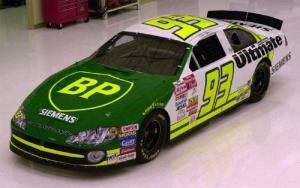Steady Staters, Futbol Fever, and NASCAR Nonsense
 I am entirely addicted to watching World Cup soccer. It’s the greatest sporting event on the planet – each match is a high-stakes struggle with international intrigue and unpredictable endings. It’s hard to top the build-up and excitement of a last minute goal that means the difference between going home and moving on to the next round (see the U.S. goal against Slovenia during the group stage). But perhaps the extreme effort from Ghana against the U.S., featuring magnificent runs and fearsome goals, did exactly that. It was amazing to see the Ghana players perform, especially while carrying the hopes of an entire continent on their shoulders (or should I say feet?). Ok, so I’m a fan of the World Cup, but what does that have to do with a steady state economy?
I am entirely addicted to watching World Cup soccer. It’s the greatest sporting event on the planet – each match is a high-stakes struggle with international intrigue and unpredictable endings. It’s hard to top the build-up and excitement of a last minute goal that means the difference between going home and moving on to the next round (see the U.S. goal against Slovenia during the group stage). But perhaps the extreme effort from Ghana against the U.S., featuring magnificent runs and fearsome goals, did exactly that. It was amazing to see the Ghana players perform, especially while carrying the hopes of an entire continent on their shoulders (or should I say feet?). Ok, so I’m a fan of the World Cup, but what does that have to do with a steady state economy?
To make the transition to an economy that supports, rather than deteriorates, our one and only home, we need to change some of the things we do. For example, it makes very little sense to continue removing the tops of mountains to extract coal and convert it to electricity and carbon dioxide in a power plant. Surely we can find ways to meet our energy needs that don’t liquidate functioning ecosystems and eons-old geologic structures while simultaneously destabilizing climate.
To have a shot at “changing some of the things we do” requires that we change our individual behaviors. Obviously we can place plenty of blame on the BPs of the corporate world, but corporations are wreaking environmental havoc because individuals, communities, and societies are demanding the products they create. If we can reduce our propensity to consume and use resources more wisely, we will be well on our way to curbing the liquidation of natural capital that comes with economic growth and all its associated consumption.
That’s what living life as a steady stater is about – making choices that meet our needs without compromising the needs of future generations. Steady staters are known for their conservation, thrift and ethics. Some might think that being a steady stater means leading a life of sacrifice and unfulfilled wants, but nothing could be farther from the truth. One’s happiness or satisfaction with life is hardly related to the quantity of material possessions owned, once basic needs for sustenance and convenience have been met. Throughout the world, researchers and citizens are coming to understand and appreciate this fact. It is altogether clear that people don’t need to consume resources wantonly to lead lives of fulfillment – in fact, one of the keys to a life of fulfillment is focusing attention elsewhere (e.g., social connections and relationships).
 That brings me back to soccer. It’s known around the world as “the beautiful game.” No, it’s not the overly colorful uniforms and creative haircuts on the players that are the origins of that moniker. It’s the tempo, teamwork, and tactics. But it also has to do with the simplicity of the game: eleven players on a side, 2 goals, one ball, and one very easy to understand rule about not using your hands (following the lead of the referees in this World Cup, let’s forget about the offside rule for the time being). Soccer is a low-throughput game. You don’t need much in the way of materials or energy to play a match. That’s also one of the reasons for its global popularity – anyone can play it anywhere. It’s a steady stater sport!
That brings me back to soccer. It’s known around the world as “the beautiful game.” No, it’s not the overly colorful uniforms and creative haircuts on the players that are the origins of that moniker. It’s the tempo, teamwork, and tactics. But it also has to do with the simplicity of the game: eleven players on a side, 2 goals, one ball, and one very easy to understand rule about not using your hands (following the lead of the referees in this World Cup, let’s forget about the offside rule for the time being). Soccer is a low-throughput game. You don’t need much in the way of materials or energy to play a match. That’s also one of the reasons for its global popularity – anyone can play it anywhere. It’s a steady stater sport!
Now let’s contrast the beautiful game with the number two spectator sport in the U.S. – NASCAR auto racing. This “sport” requires massive expenditures of energy and materials as racers roll around (and around and around and around) the track for 4 or 500 miles, strapped into inefficient, CO2-spewing, tire-trashing cars. Setting aside judgment about the merits of watching cars drive in a circle, mostly in anticipation of a life-threatening and auto-obliterating pileup, there is no doubt that a NASCAR race is a consumptive and wasteful enterprise. Adding insult to injury, every inch of space on the cars and the people driving them is covered by advertisements aimed at increasing consumption!

93 barrels of oil on the shore...
Soccer, NASCAR – what’s the difference? Why make a distinction when they’re both just sports, and there are so many critical problems that we ought to be working to solve? Sports are a big part of many cultures around the world – hence the popularity of the World Cup and the inclusion of sports scores and stories in just about every newspaper. Part of being human is playing games, and doing so may be especially important when we face difficult times. We can all use a little escape from some of the grim realities swirling around us. There are some games, however, that fit within the cultural and economic paradigms of sustainability, and some that don’t. Count me a futbol fan!





Thanks for initiating this conversation about choosing sustainable forms of recreation.
The best outcome I could imagine would be a return to kids playing sports in the streets (with fewer cars), and rediscovering the local ball fields.
NASCAR, NFL, NBA, etc. would be replaced by more localized, far less commercialized options.
Of course, in a future of fewer professional sports, many people might also trade the spectator role for becoming amateur athletes themselves.
Driving an automobile ain’t a sport. It’s a pre-television reality show with actors, directors, groupies and increasingly expensive sets. Formula One is the road version of Survivor, Big Brother, and others of that ilk. The only real link between sports and NASCAR is that the two entertainment enterprises are “sponsored” by the same supra-national corporate zombies.
Interestingly enough, at one time–60 years ago–NASCAR was rather like soccer. It was comprised largely of home-built cars with parts scavenged from junk yards and car dealerships, races were at local county fair grounds (they all had dirt tracks for horse racing), and the entry barrier was very low: a factory worker could fund a team from a week’s pay check, and that combined with a bit of daring and you could be in the race business. For many years auto racing had more amateur participants than any other sport in the US. Big money on Saturday night at a local track was $100 for the winner, and many races were “$100 claimers;” if you finished in the top three spots and anyone offered you $100 in cash within 30 minutes of the end of the race you were required to sell the car to them, right there, on the spot–if you refused you were disqualified from the race and lost the prize money.
It was truely an amateur sport.
Having played hockey, and driven a race car on the semi-pro circuit in the 1990’s, driving a race car on a short track (less than 1/2 mile) is the most exhausting endurance event I’ve ever been in.
Racing re-invented.
It would be fun to have a new amateur race series: a 50 mile race and you’re only allowed a pint of gasoline, or 3.66 kWhr of energy. The vehicle must be safe for the driver, other competitiors, and spectators,…. other than that, “run what ya’ brung.”
When the green flag drops the thinking will get serious; and we might “sell” the idea of more economical transportation in the US.
Greetings,
Yes, it’s time to trade-in NASCAR… For DEMOLITION DERBY. Let’s face it, most fans go to the races to see the wrecks, the pile-ups, smoking tires, spinning, flaming race cars and such. It’s hard to get over to the beer stand for fear of missing THE big wreck, eh.
So why not skip the boring round and round and get down to crashes, big time? Now THAT is sport;-) Not to mention a great way to get those oil burners off the roads…
edde
To quote Charles Barkley (and Matt, above) “NASCAR ain’t a sport”.